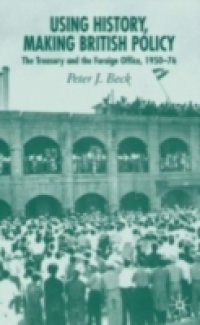Despite it being frequently dismissed as irrelevant to public policy, during the late 1950s Whitehall departments were encouraged to make history a formal input to the policymaking process with the aim of improving the efficiency of British government by saving time and money. In this book, case studies centred upon the Treasury and the Foreign Office offer insights regarding the benefits and problems of using history, most notably the difficulties of actually applying the lessons of the past. Apart from focusing on central themes in the history of twentieth century Britain; these include decline, economic weakness, the Abadan and Suez disputes, and the role of oil diplomacy; the book illuminates ongoing debates about the nature, use and relevance of history in the contemporary world. By analyzing the manner in which British policymakers viewed and exploited (or failed to exploit) history's policy potential, this study possesses both a historical and contemporary significance. As a result, the topic has a relevance to staff, postgraduates and undergraduates in not only History but also Politics, Policy Studies, Defence Studies, International Politics and Relations, Economic History and Economics.

